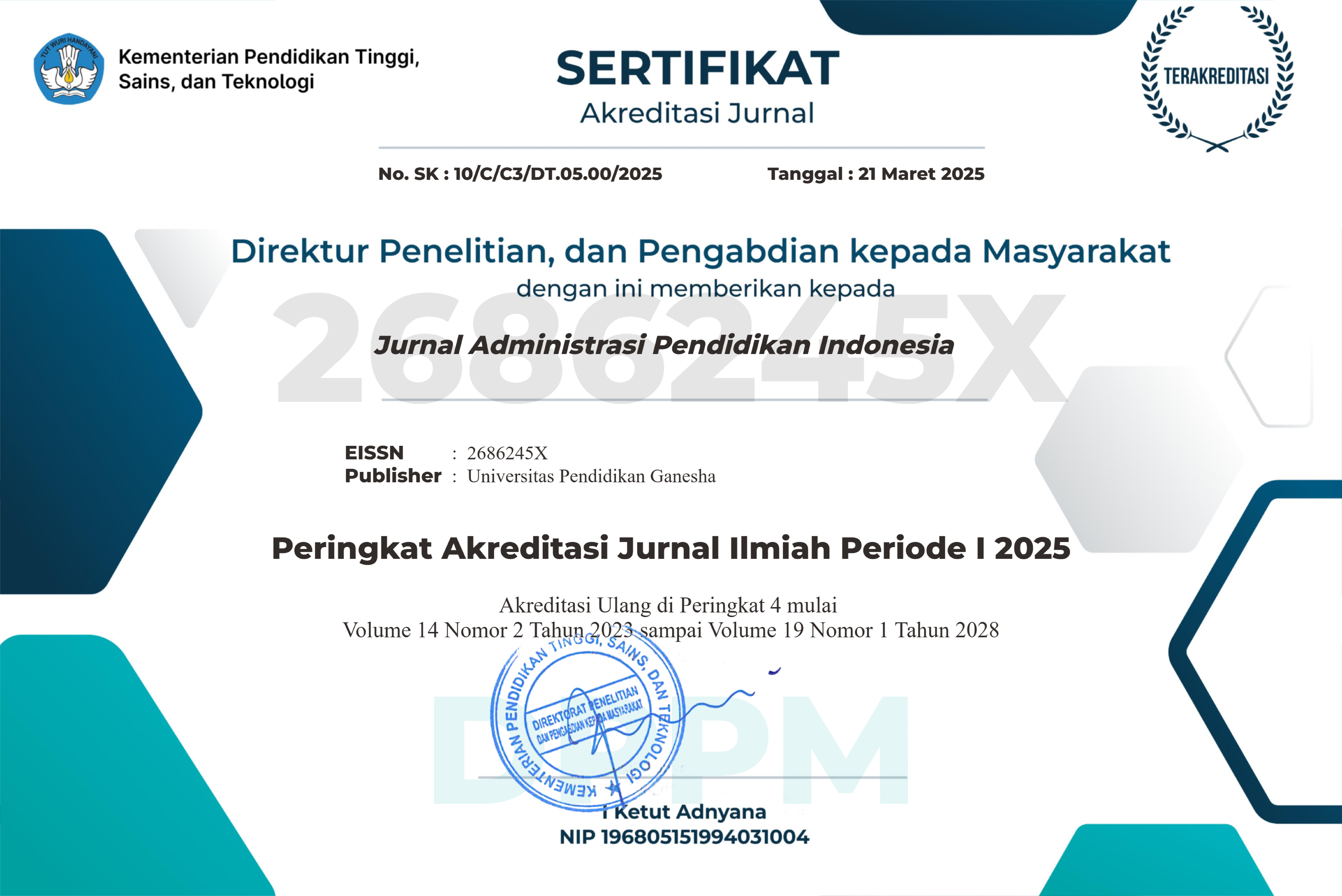The Influence of Integrity, Spirituality, Culture, and Work Motivation on Employee Performance at Mutiara School.
Abstract
This study aims to determine the effect of integrity, spirituality, culture, and work motivation on employee performance. The sample of this research is 40 employees at Mutiara School. This study used an ex-post facto design using descriptive statistical data analysis techniques, simple correlation, partial correlation, multiple correlation, and multiple regression. The results showed that: 1) There is a positive and significant influence between integrity and employee performance with a positive B value of 0.699 and a sig value of 0.001 , 2) There is a positive and significant influence between spirituality and employee performance with a positive B value of 0.657 and a sig value of 0.003, 3) There is a positive and insignificant influence between culture and employee performance with a positive B value of 0.137 and a sig value of 0.437, 4) There is a positive and insignificant influence between work motivation and employee performance with a A positive B is 0.088 and a sig value is 0.425. 5) Simultaneously there is a positive and significant correlation between integrity, spirituality, culture, work motivation and employee performance of 37.587.
References
Agung, A. A. G. (2018). Metode Penelitian Kuantitatif (Perspektif Manajemen Pendidikan). Universitas Pendidikan Ganesha.
Andayani, I., & Tirtayasa, S. (2019). Pengaruh Kepemimpinan , Budaya Organisasi , Dan Motivasi Terhadap. 2(1), 45–54.
Bacal, R. (2002). Performance Management. Terjemahan Surya Dharma, Yanuar Irawan. Jakarta: Gramedia Pustaka Utama.
Beheshtifar, & Zare. (2013). Employee Creativity: A compulsory Factor in Organizations. Institute of Interdisciplinary Business Research, 5(2), 242–247. https://journal-archieves33.webs.com/242-247.pdf
Brahmasari, I. ayu, & Suprayetno, A. (2008). Pengaruh Motivasi Kerja , Kepemimpinan dan Budaya Organisasi Terhadap Kepuasan Kerja Karyawan serta Dampaknya pada Kinerja Perusahaan ( Studi kasus pada PT . Pei Hai International Wiratama Indonesia ). Pascasarjana Universitas 17 Agustus Surabaya, 10(1996), 124–135. https://jurnal manajemen .petra.ac.id/index.php/man/article/view/17039/17003
Effendi, U. (2014). Asas Manajemen. Jakarta: Rajawali Pers.
Endro, G. (2017). Menyisik Makna Integritas Dan Pertentangan dengan Korupsi. Jurnal Universitas Bakrie, 2(1), 11–23. https://jurnal.kpk.go.id/index.php/integritas/article/view /159
Mahayasa, I. G. A. (2018). Pengaruh Kepuasan Kerja Dan Budaya Organisasi Terhadap Komitmen Organisasional Dan Organizational Citizenship Behavior Perawat. Jurnal Manajemen, Strategi Bisnis Dan Kewirausahaan, 73–86.
Moeljono, D. (2005). Budaya Organisasi dalam Tantangan. PT. Elex Media Komputindo.
Muis, Muhammad Ras, J. J., & Fahmi, M. (2018). Pengaruh Budaya Organisasi Dan Komitmen Organisasi Terhadap Kinerja Karyawan. Jurnal Ekonomi & Ekonomi Syariah, 1(1), 9–25. https://stiealwashliyahsibolga.ac.id/jurnal/index.php/jesya/article/view/7
Mulyadi. (2010). Diagnosis Kesulitan Belajar & Bimbingan Terhadap Kesulitan Belajar Khusus. Yogyakarta: Nuha Litera.
Oktaviani, N. M., & Manuaba, I. B. (2021). Kontribusi Kecerdasan Emosional dan Motivasi Kerja Terhadap Komitmen Kerja Guru. MIMBAR PGSD Undiksha, 9(1), 116. https://doi.org/10.23887/jjpgsd.v9i1.32113
Petchsawang, P., & Duchon, D. (2012). Journal of Management , Spirituality & Workplace spirituality , meditation , and work performance. Journal of Management, Spirituality & Religion, 9(2), 189–208. https://digitalcommons.unl.edu/cgi/viewcontent.cgi?article= 1095&context=managementfacpub
Prameswari, A. S., Yustrianthe, R. H. (2015). Analisis Faktor–Faktor yang Memengaruhi Audit Delay (Studi Empiris Pada Perusahaan Manufaktur Yang Terdaftar Di Bursa Efek Indonesia). Universitas Tarumanagara Journal of Accounting, 19(1), 13–24. https:// ecojoin.org/index.php/EJA/article/view/113
Rachmawati, Y., & Suyatno, S. (2021). The effect of principals’ competencies on teachers’ job satisfaction and work commitment. Participatory Educational Research, 8(1), 362–378. https://doi.org/10.17275/per.21.21.8.1
Rani, Lambey, L., & Pinatik, S. (2018). Pengaruh Integritas, Kompetensi, Dan Profesionalisme Terhadap Produktivitas Kerja Karyawan Bagian Akuntansi Pada PT. Bank Mandiri (persero) Tbk Manado. Jurnal Riset Akuntansi Going Concern, 13(3), 41–51. https://ejournal.unsrat.ac.id/index.php/gc/article/view/19942/19538
Redjeki Dwi Prawani, S., & Herdiansyah, J. (2013). Memahami Sebuah Konsep Integritas. Jurnal STIE Semarang, 5(2), 1–14. https://jurnal3.stiesemarang.ac.id/index.php/jurnal/ article/view/74
Russel, E. M., Williams, S. W., and Gleason-Gomez, C. (2010). Teachers’ perceptions of administrative support and antecedents of turnover. Journal of Research in Childhood Education, 24(3), 195–208. https://www.researchgate.net/publication/254311753_ Teachers’_Perceptions_of_Administrative_Support_and_Antecedents_of_Turnover
Sugiyono. (2017). Metode Penelitian Kuantitatif, Kualitatif, dan R&D. ALFABETA.
Sutrisno, E. (2016). Manajemen Sumber Daya Manusia. Kencana Prenada Media Group.
Copyright (c) 2023 L. Widayati, I.G.K.A. Sunu, I.P.W. Ariawan

This work is licensed under a Creative Commons Attribution-ShareAlike 4.0 International License.











